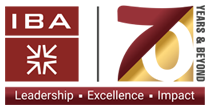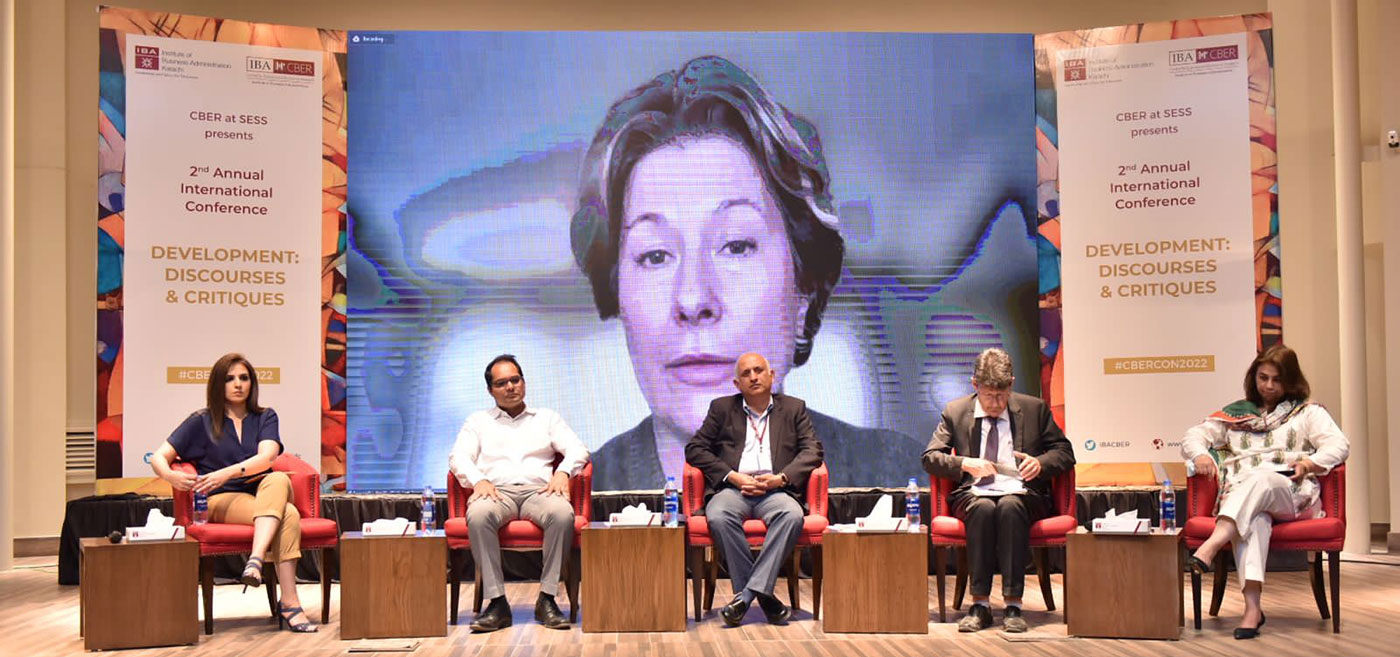The 2nd Annual International Conference on 'Development: Discourses and Critiques' concludes at IBA Karachi
March 25-27, 2022: The School of Economics and Social Sciences (SESS), in collaboration with the Center for Business and Economic Research (CBER) at the IBA Karachi, hosted the 2nd Annual International Conference titled, 'Development: Discourses and Critiques'. The three-day conference was held at the IBA Karachi, Main Campus. The conference was attended by esteemed guests and speakers from across the globe. The conference was chaired by Executive Director, IBA Karachi, Dr. S Akbar Zaidi.
This year's theme invited works from a wide range of disciplines to critique, question and reconsider the experiences of transnational, national and sub-national actors with the development process. What does 'development' mean for different actors, and how has this narrative shifted over time? How does development define and redefine power relations and what implications does this have for different groups? How have colonial experiences shaped futures and how does one deconstruct ideas rooted in these experiences?
To encourage diversity within modes of thinking, the conference hosted presenters and participants from diverse backgrounds, including Skardu, Sukkur, Gilgit, Quetta, and Islamabad from Pakistan, and multiple professors from esteemed universities from the USA.
By centering radical subthemes, including but not limited to, decolonial and feminist frameworks, this conference aimed to center critical perspectives that help us gain a nuanced understanding of social change and development.
Conference Day 1
The first keynote speaker was Dr. Mushfiq Mobarak, Professor of Economics, Yale University, USA. He spoke in depth on 'Seasonal Poverty and Seasonal Migration'. The session was moderated by Arooj Waheed Dar, Lecturer, SESS, IBA Karachi. Dr. Mobarak recognized the forms of poverty that emerge during seasonal changes and highlighted its implications, specifically in the form of seasonal hunger. The second section of the address focused on the attempts that help address this problem through structural strategies such as micro-loans that help bridge the financial strain in the lean season.
The first panel discussion of Day 1 was titled 'Institutions, Governance and Inequalities' which included the following four scholars: Dr. Sultan Mehmood, New Economic School, Moscow; Dr. Abid Aman Burki, Senior Research Fellow, Mahbab ul Haq Research Centre, Lahore University of Management Sciences; Dr. Hafeez Jamali, Senior Anthropologist and Civil Servant; Robina Ather, Chairperson, National Tariff Commission, and Dr. Asma Hyder, Professor of Economics and Dean, SESS, IBA Karachi. The session highlighted various statistics on the economic and social inequalities in Pakistan and included the inclusion of indigenous communities within the policy-making process, and judicial independence in Pakistan.
In the session titled 'Agrarian Crisis and South Asian Political Economy', Dr. Barbara Harriss-White, Professor Emeritus of Development Studies and Emeritus Fellow of Wolfson College, University of Oxford, was in conversation with Dr. Ahmed Azhar from the IBA as a moderator. Dr. Harriss-White shared her close insights and research on the South Asian political economy, particularly food and energy, and aspects of deprivation.
The second panel of the day was titled 'Urban Development: Practices and Realities' and included five scholars and researchers: Dr. Mubbashir Rizvi, Anthropologist, American University; Palwashay Shahab, Social Justice Lawyer and Researcher; Haya Fatima Iqbal, Emmy winning documentary filmmaker; Dr. Laila Farooq, Assistant Professor, IBA Karachi and Director, CBER; and Dr. Shehram Mokhtar, Assistant Professor, IBA Karachi.
The first day also included around 20 presentations by undergraduate and graduate students who shared their work on various segments of the bigger field of development. Two student circles, one on calligraphy, and another on breath-body work, also took place.
Conference Day 2
The keynote address of the day and the second keynote for the conference, was Hans Timmer, Chief Economist, World Bank South Asia. The address emphasized the need to reorient the development sector's emphasis towards the digital services and digital economy. Mr. Timmer underlined the need to account for the global mobility of capital through various interactions with the internet.
The first panel of the day, and the third one for the conference, was titled 'Impact Evaluation of Public Policies.' The discussion included the following five panelists: Dr. Ishrat Husain, Professor Emeritus IBA and Former Advisor to the Prime Minister; Dr. Sanval Nasim, Assistant Professor of Economics, Lahore University of Management Sciences; Najy Benhassine, Country Director of World Bank Pakistan, South Asia Region; Dr. Shehreen Mustafa, Civil Servant - Sindh Rural Support Organization; and Martin Dawson, Deputy Head of Mission and British Deputy High Commission. The panel discussed the importance of different strategies with which impact evaluation of public policies can be conducted.
The second panel of the day, and the fourth one for the conference, was titled 'Why Pakistan failed to achieve sustainable economic growth?'. The following five discussants contributed to the discussion: Dr. Gonzalo Varela, Senior Economist, World Bank; Dr. Sajid Amin Javed, Research Fellow, Head Policy Solutions Lab - SDPC; Dr. Izza Aftab, Assistant Professor, Beaconhouse National University; Dr. Wasim Shahid Malick, Professor Mehbub ur Raschid Chair, University of Peshawar; and Dr. Muhammad Nasir, Assistant Professor, Economics department, IBA Karachi. The panelist brought their own unique and rich perspectives to the discussion that questioned the Pakistani economic growth at the intersection of employment generation and economic inclusion across the board. The discussion analyzed the role of structural issues, policy failures, and the potential growth capacity in this regard.
The third panel of the day, and the fifth one for the conference, was titled 'Dissent,' which included the following four discussants: Dr. S Akbar Zaidi, Executive Director, IBA Karachi; Dr. Aasim Sajjad Akhtar, Associate Professor of Political Economy, Quaid-e-Azam University; Sheema Kirmani, Social activist and Performer; and Asma Shirazi, Pakistani Journalist. This panel provided comparative perspectives from theoretical frameworks and grassroot organizing all over Pakistan to underline the interplay between the structure of domination and hegemony with perceptions of rights and citizenship. This panel provided critiques against such hegemonic power and underlined the alternative possibilities that grounded more towards equity, inclusion, and diversity.
An Inaugural ceremony on a collaboration between the IBA and World Bank on 'Social Inequality Lab & Economic Growth and Forecasting Lab' was also held. This collaboration intends on collecting more situated and expansive data on inequality and growth from across Pakistan using diverse methods that will further help in providing more accurate and relevant knowledge production and policies.
The first conversation of the day was titled 'Social Inequality and the Dynamics of Political and Ethnolinguistic Divides in Pakistan, 1970-2018.' The conversation engaged the following four thinkers: Dr. Sultan Mehmood, Assistant Professor, New Economics School, Moscow; Amber Shamsi, Director, CEJ, IBA Karachi; Dr. Aqdas Afzal, Assistant Professor of Economics, and Program Director, Habib University; Asim Bashir Khan, Economics, Public Finance Expert, IBA Faculty.
The second conversation was titled 'Sludge: Administrative Burdens, Confusing Forms, Time Taxes, and Other Problems,' where Professor Cass Sunstein, Professor at Harvard University engaged in a dialogue with Dr. Sahar Nadeem, Assistant Professor and Chairperson, Social Sciences & Liberal Arts, IBA Karachi.
The second day also included 50 presentations by undergraduate and graduate students who shared their work on various segments of the larger field of development. Two student circles on resistances also took place, the first did close readings of two poetic texts to trace themes of resistance towards unsustainable development within poetic memory, while the second circle by Karachi Bachao Tehreek discussed the greenwashing of dispossession through the case study of Malir Expressway.
Conference Day 3
Addressing the conference, Executive Director, IBA Karachi, Dr. S Akbar Zaidi welcomed the President of the Islamic Republic of Pakistan, His Excellency, Dr. Arif Alvi and thanked him for coming to the IBA for the second time this month. Dr. Zaidi commended the conference participants for submitting around 350 papers on development and said that this was a beneficial step for Pakistan. He also said that to encourage diversity of thoughts, 150 students from across Pakistan were invited to participate and to share their papers on various themes. Dr. Zaidi also said that he was proud to say that women were adequately represented in this conference as per the essence of diversity. He appreciated the dynamic female participants and the women leaders at IBA for their contributions to the discourse and the community at large. Sessions on women empowerment and disability further added to the multifaceted theme of the conference.
Speaking at the concluding ceremony of the conference, Dr. Alvi said that effective communication plays a significant role in development as it helps us overcome the challenges faced in the development process. Appreciating Pakistani women, he said that they have immense talent and that 70 to 80 percent of them get admission into Pakistani medical colleges on merit. He also said that the art of communication is vital in empowering women and for placing them on the path of development. Dr. Alvi concluded his address with appreciating the conference for bringing together diverse discourses with an acknowledgement of its impact on future policy-making.
The first panel discussion for the day, and the sixth one for this conference, was titled 'Advocating for inclusive development: a discussion on accessibility in Pakistan,' with the following four panelists: Haris Rauf Jaswal, Business Planning Manager, Consumer, Rural & SME Banking, Habib Bank; Jawaid Rais, President Disabled Welfare Association (DWA) Karachi; Fatima Jaffry, Provincial Coordinator National Forum of Women with Disabilities (NFWWD); and Muhammad Atif Sheikh, Executive Director, Special Talent Exchange Program Pakistan. The panelists emphasized the need for development to be inclusive for differently abled people. This inclusivity was suggested through making space for their active participation along with structural changes to accommodate them.
The last panel for the conference, titled, 'Just Transition,' which included the following four panelists: Samantha Smith, Country Director of the Just Transition Centre; Humayun Azad, CEO of Ray Analytics; Haroon Sharif, Consultant of UNDP Pakistan and former State Minister of Investments; and Sadaf Abid, International Consultant. This panel focused on the clean and green energy agenda with an emphasis towards business opportunities. The need for collaboration between all agents of society towards meeting the green agenda requirements was also underlined.
The last day of the conference also included 37 presentations by undergraduate, graduate, and doctoral students across a range of themes including employment and safety, state and development, literary and visual worlds, social psychology, and the work of some prominent economists.
The three-day conference attracted the presence of 5 international speakers, 150 student presenters, 58 out stationed students, and more than 1000 attendees.



